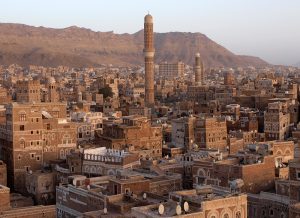
Old Sana’a, Wikimedia Commons
Ali Abdallah Saleh is dead – what happens to his assets now?
On the 4 December it was widely reported that the former President of Yemen, Ali Abdallah Saleh, had been killed in fighting with the Houti militia.
Born in Sanaa’, much of Yemen’s recent history has been bound up with former President Saleh. With a background in the then-North Yemen military, Saleh assumed the presidency of North Yemen in 1978 and become President of a reunited Yemen in 1990, a position he was ultimately to hold until 2011.
After protests starting in January 2011 and a deal brokered by Saudi Arabia, Saleh signed an agreement to hand over power to his deputy – Abdrabbuh Mansour Hadi –and to start a transition to democratic rule. After three months of interim rule, Hadi stood unopposed in presidential elections in March 2012.
During his time in power, Saleh is alleged to have amassed a fortune of between US$32 and $60 billion, transferred abroad through false names and in the form of property, cash, shares, gold and other commodities. However, as part of the deal made for Saleh to give up power, the Yemen authorities agreed to provide him with immunity from prosecution, making recovery of any ill-gotten wealth very challenging.
Following Saleh’s removal from power, a transition period was begun, which quickly started to break down. Attacks by Al Qaeda, strong separatist claims, the loyalty of the army to Saleh, alongside corruption, unemployment and food insecurity weakened Hadi’s government. This weakness was capitalised upon by the Houthi movement, a political-religious movement with a base north of Sanaa’, which led a military attack against the Hadi government and was able to capture Sanaa’ and much of the North and West of Yemen, with the support of Saleh and forces loyal to him within the army. Hadi fled to Aden, in the south of Yemen and is currently in Saudi Arabia, with his forces controlling the South and East of Yemen. In March 2015, Saudi Arabia launched a military coalition offence against the Houthis.
In response to the civil war, the UN Security Council passed a resolution in 2014, which required Member States to take a number of steps, including freezing any assets belonging to Ali Abdallah Saleh in their territory. With Saleh’s death, there is a risk that the UN Security Council will remove the order freezing his assets. This would be a mistake.
Time and space need to be given to the Yemeni people and Yemeni authorities to determine whether the money in fact was the proceeds of grand corruption by Saleh and members of his regime and to then start processes to return the money to the Yemeni people. Yemenis also need to be given time to decide the best way to return these assets transparently and accountably to the people of Yemen. The international community has an opportunity now to keep the freeze in place and live up to its responsibility to the Yemeni people. It should take that opportunity.
